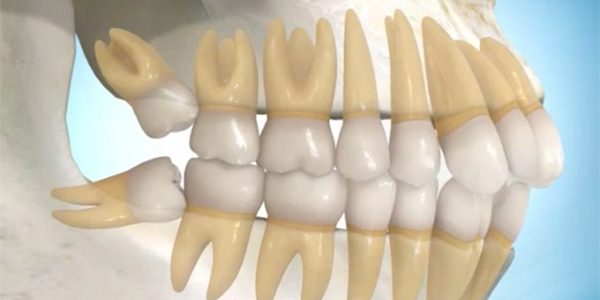
Wisdom — The word conjures up the image of an elderly professor, stroking his (or her) beard, putting forth opinions based on years of knowledge. Add “tooth” to wisdom and you have a very different picture. The term “wisdom tooth” has a negative aura (much like root canal).
Wisdom teeth (technically “third molars“) are 4 teeth that usually appear around the age of 17. (Hence the term “wisdom”-17 being the age when a person was thought to become an adult). I personally thought the age of wisdom was nine, when I realized I knew more than my parents , or so I believed at the time.
Anthropologists see wisdom teeth as a throwback to prehistoric times. Our jaws were longer and wider. There was plenty of room for these extra teeth, needed for those caveman diets. Picture a Cro-Magnon type chomping away on a wild buffalo. Fast forward a few million years—- our jaws are smaller, hence the problem with third molars.
A large proportion of the population does not have enough room for wisdom teeth to assume a normal position. They can lie horizontally, grow out towards the cheeks, get stuck under adjacent teeth, develop cysts, and in general, play havoc with your mouth.
Past wisdom (no pun intended) dictated that an oral surgeon would remove most of these teeth. Current thinking is to remove only those teeth that have partially grown thru the gums. Bacteria can enter this opening, causing infections. A tooth that is far out of position will cause trauma to the delicate tissue inside your mouth and must be removed. Other reasons for removal include a cyst around the teeth, or potential damage to an adjacent tooth. If a third molar is laying on its side, but encased in bone, current practice is to leave it alone-unless the oral surgeon is having trouble with the payments on his new Ferrari.
In general, lower wisdom teeth are more difficult to remove than other teeth, due to their position and malalignment. Several complications can result from having this type of surgery (i.e. nerve damage, numbness, infections, damage to adjacent teeth, etc.). The surgeon will explain these potential problems and have you sign an “informed consent ” or as we call it a “cover my ass form”. This is not intended to scare you, as the percentage of problems is very low.
Some of you will be blessed with trouble-free wisdom teeth. Others will experience difficulty with one or more of the teeth. Rest assured that oral surgeons are highly trained and experienced in the removal of these troublesome teeth. Your IQ will not be affected by their removal.

What Do You Think? Leave A Comment!